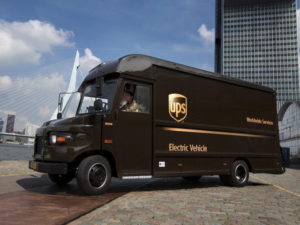Delivery firm UPS has deployed a new smart grid solution that will help it switch its delivery fleet over completely to electric trucks.

Developed under the ‘Smart Electric Urban Logistics (SEUL)’ project with UK Power Networks and Cross River Partnership – using funding secured from the Office for Low Emission Vehicles – the new charging technology at the firm’s central London site gives UPS the ability to recharge an entire fleet of electric vehicles simultaneously without the need for upgrades to the power supply grid.
The smart grid uses a central server which is connected to each EV charge post as well as the grid power supply and the on-site energy storage. The technology spreads charging out through the night to ensure that all EVs are fully charged for the morning while also providing all the power needed for the various operations at the building – but without exceeding the maximum power available from the grid. It also makes use of onsite energy storage batteries, which could actually repurpose second-life batteries from the firm’s EVs in the future.
UPS said the breakthrough technology enables it to increase the number of EVs operating at the site from the current limit of 65 to all 170 trucks based there – meaning it would no longer need to run traditional combustion engine-powered vehicles.
“UPS thinks this is a world first, right in the heart of a mega-city. We are using new technology to work around some big obstacles to electric vehicle deployment, heralding a new generation of sustainable urban delivery services both here in London and in other major cities around the world,” said Peter Harris, director of sustainability, UPS Europe.
The firm – which currently has more than 300 electric vehicles and nearly 700 hybrid electric vehicles deployed in Europe and the US – added that the latest initiative builds on existing advances that are helping to further reduce the cost of EVs, accelerating the transition to when such vehicles will be cheaper to run than their diesel counterparts.
“Our previous work on electric freight vehicles has shown that local grid infrastructure constraints are one of the main barriers to their large-scale uptake,” said Tanja Dalle-Muenchmeyer, programme manager electric freight at Cross River Partnership. “We need to find smarter solutions to electric vehicle charging if we want to benefit from the significant air quality and environmental benefits these vehicles offer, and we believe this is such a solution.”

